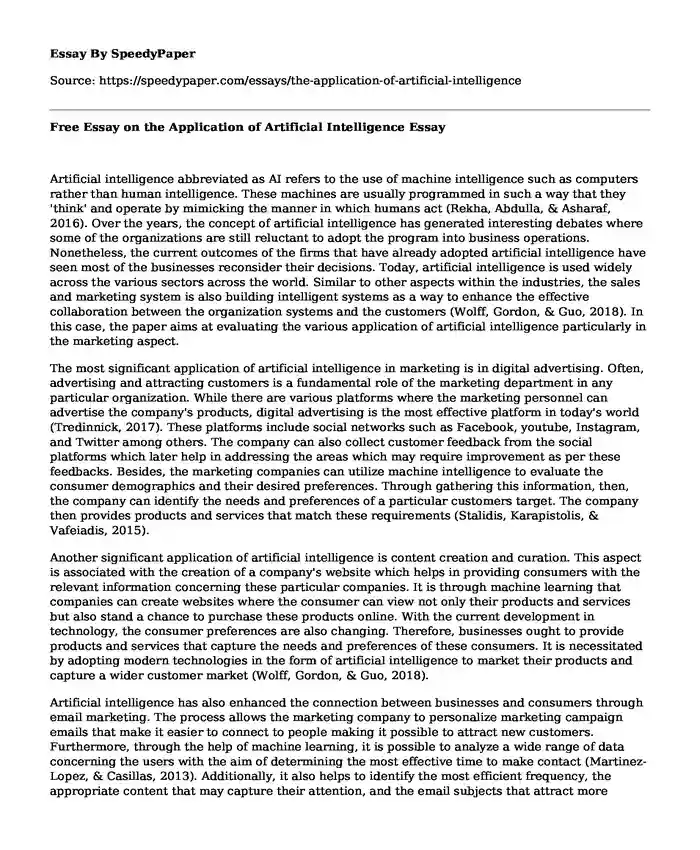
| Type of paper: | Essay |
| Categories: | Artificial intelligence |
| Pages: | 3 |
| Wordcount: | 710 words |
Artificial intelligence abbreviated as AI refers to the use of machine intelligence such as computers rather than human intelligence. These machines are usually programmed in such a way that they 'think' and operate by mimicking the manner in which humans act (Rekha, Abdulla, & Asharaf, 2016). Over the years, the concept of artificial intelligence has generated interesting debates where some of the organizations are still reluctant to adopt the program into business operations. Nonetheless, the current outcomes of the firms that have already adopted artificial intelligence have seen most of the businesses reconsider their decisions. Today, artificial intelligence is used widely across the various sectors across the world. Similar to other aspects within the industries, the sales and marketing system is also building intelligent systems as a way to enhance the effective collaboration between the organization systems and the customers (Wolff, Gordon, & Guo, 2018). In this case, the paper aims at evaluating the various application of artificial intelligence particularly in the marketing aspect.
The most significant application of artificial intelligence in marketing is in digital advertising. Often, advertising and attracting customers is a fundamental role of the marketing department in any particular organization. While there are various platforms where the marketing personnel can advertise the company's products, digital advertising is the most effective platform in today's world (Tredinnick, 2017). These platforms include social networks such as Facebook, youtube, Instagram, and Twitter among others. The company can also collect customer feedback from the social platforms which later help in addressing the areas which may require improvement as per these feedbacks. Besides, the marketing companies can utilize machine intelligence to evaluate the consumer demographics and their desired preferences. Through gathering this information, then, the company can identify the needs and preferences of a particular customers target. The company then provides products and services that match these requirements (Stalidis, Karapistolis, & Vafeiadis, 2015).
Another significant application of artificial intelligence is content creation and curation. This aspect is associated with the creation of a company's website which helps in providing consumers with the relevant information concerning these particular companies. It is through machine learning that companies can create websites where the consumer can view not only their products and services but also stand a chance to purchase these products online. With the current development in technology, the consumer preferences are also changing. Therefore, businesses ought to provide products and services that capture the needs and preferences of these consumers. It is necessitated by adopting modern technologies in the form of artificial intelligence to market their products and capture a wider customer market (Wolff, Gordon, & Guo, 2018).
Artificial intelligence has also enhanced the connection between businesses and consumers through email marketing. The process allows the marketing company to personalize marketing campaign emails that make it easier to connect to people making it possible to attract new customers. Furthermore, through the help of machine learning, it is possible to analyze a wide range of data concerning the users with the aim of determining the most effective time to make contact (Martinez-Lopez, & Casillas, 2013). Additionally, it also helps to identify the most efficient frequency, the appropriate content that may capture their attention, and the email subjects that attract more attention hence enhancing the number of clicks.
In conclusion, artificial intelligence has played a significant role in enhancing the operational efficiency of the marketing element in various organizations across the world. In the discussion above, it is evident that the applications are focused on matching the consumer needs and preferences with the aim of attracting more customers.
References
Martinez-Lopez, F. J. M., & Casillas, J. (2013). Artificial intelligence-based systems applied in industrial marketing: An historical overview, current and future insights. Industrial Marketing Management, 42(4), 489-495. doi: 10.1016/j.indmarman.2013.03.001
Rekha, A. G., Abdulla, M. S., & Asharaf, S. (2016). Artificial Intelligence Marketing: An application of a novel Lightly Trained Support Vector Data Description. Journal Of Information And Optimization Sciences, 37(5), 681-691. doi: 10.1080/02522667.2016.1191186
Stalidis, G., Karapistolis, D., & Vafeiadis, A. (2015). Marketing Decision Support Using Artificial Intelligence and Knowledge Modeling: Application to Tourist Destination Management. Procedia - Social And Behavioral Sciences, 175, 106-113. doi: 10.1016/j.sbspro.2015.01.1180
Tredinnick, L. (2017). Artificial intelligence and professional roles. Business Information Review, 34(1), 37-41. doi: 10.1177/0266382117692621
Wolff, J., Gordon, S., & Guo, D. (2018). The Rise of Artificial Intelligence. Advances In Social Sciences Research Journal. doi: 10.14738/assrj.56.4722
Cite this page
Free Essay on the Application of Artificial Intelligence. (2022, Feb 14). Retrieved from https://speedypaper.com/essays/the-application-of-artificial-intelligence
Request Removal
If you are the original author of this essay and no longer wish to have it published on the SpeedyPaper website, please click below to request its removal:
- Free Essay: Sales Techniques and Metrics
- Essay Sample on Cognitive Behavioral Therapy
- Work Experience Essay Samples
- Free Essay with Analysis of Yes, The Wealthy Can Be Deserving
- Music Essay Example - This Is America by Donald Glover
- Should the Voting Age Be Lowered to Thirteen Years? Free Essay
- Total Peripherals Group - Free Essay
Popular categories




